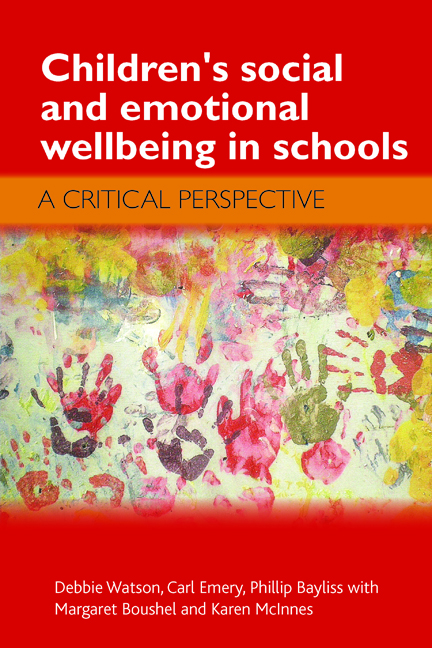Chapter 5 - The measurement of wellbeing
Published online by Cambridge University Press: 01 September 2022
Summary
Introduction
In Chapter 3, we explored issues of policy and wellbeing and, in Chapter 4, we examined the practice in schools to promote wellbeing, with a particular emphasis on the Social and Emotional Aspects of Learning (SEAL) programme. Policy (and its resulting practice) is dependent on measurement. The purpose of policy is to enable change, and change can only impact on those aspects of social life that can be measured. Measurement is necessary as part of processes of the examination (Foucault, 1991a) of the public body underpinning the ability of the state to regulate the lives of its citizens and to control their destinies.
Such measurement is focused on the ‘social body’, through the action of the ‘body politic’ (Scheper-Hughes and Lock, 1987). Policy also impacts on the phenomenological body of the person. Through the discursive practices of examination and the modern concept of intervention, the measurement of wellbeing is increasingly used to identify problems in the population (especially children) as part of an accepted policy strategy of early intervention: spot problems early and they can be eradicated. The shift towards emphasis on the phenomenological body, as opposed to action focused on the social body, reflected a shift in the neo-liberal agenda pursued by New Labour during their term of office. In 1997, on taking power, Tony Blair emphasised activity focused on the failings of the phenomenological body:
Social exclusion is about income but it is about more. It is about prospects and networks and life-chances. It's a very modern problem, and one that is more harmful to the individual, more damaging to self-esteem, more corrosive for society as a whole, more likely to be passed down from generation to generation, than material poverty. Getting government to act more coherently is the key. Everyone knows that the problems of social exclusion – of failure at school, joblessness, crime – are woven together when you get down to the level of the individual's daily life, or the life of a housing estate…. Our actions on exclusion reflect our values and those of the British people. It offends against our values to see children with no prospect of work, families trapped in poverty, neighbourhoods blighted by crime. But this isn't just about compassion. It's also about self-interest. If we can shift resources from picking up the costs of problems to preventing them, there will be a dividend for everyone.
- Type
- Chapter
- Information
- Children's Social and Emotional Wellbeing in SchoolsA Critical Perspective, pp. 77 - 90Publisher: Bristol University PressPrint publication year: 2012



